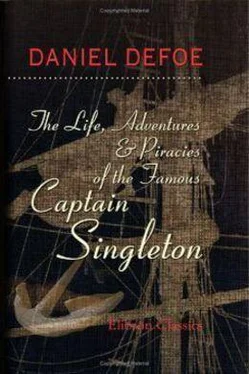Accordingly I fell a–swearing at him, and called to my men to tie his hands behind him, and so we put him into our boat and carried him away. When I had him on board, I called him to me. "Now, friend," says I, "I have brought you away by force, it is true, but I am not of the opinion I have brought you away so much against your will as they imagine. Come," says I, "you will be a useful man to us, and you shall have very good usage among us." So I unbound his hands, and first ordered all things that belonged to him to be restored to him, and our captain gave him a dram.
"Thou hast dealt friendly by me," says he, "and I will be plain with thee, whether I came willingly to thee or not. I shall make myself as useful to thee as I can, but thou knowest it is not my business to meddle when thou art to fight." "No, no," says the captain, "but you may meddle a little when we share the money." "Those things are useful to furnish a surgeon's chest," says William, and smiled, "but I shall be moderate."
In short, William was a most agreeable companion; but he had the better of us in this part, that if we were taken we were sure to be hanged, and he was sure to escape; and he knew it well enough. But, in short, he was a sprightly fellow, and fitter to be captain than any of us. I shall have often an occasion to speak of him in the rest of the story.
Our cruising so long in these seas began now to be so well known, that not in England only, but in France and Spain, accounts had been made public of our adventures, and many stories told how we murdered the people in cold blood, tying them back to back, and throwing them into the sea; one half of which, however, was not true, though more was done than is fit to speak of here.
The consequence of this, however, was, that several English men–of–war were sent to the West Indies, and were particularly instructed to cruise in the Bay of Mexico, and the Gulf of Florida, and among the Bahama islands, if possible, to attack us. We were not so ignorant of things as not to expect this, after so long a stay in that part of the world; but the first certain account we had of them was at Honduras, when a vessel coming in from Jamaica told us that two English men–of–war were coming directly from Jamaica thither in quest of us. We were indeed as it were embayed, and could not have made the least shift to have got off, if they had come directly to us; but, as it happened, somebody had informed them that we were in the Bay of Campeachy, and they went directly thither, by which we were not only free of them, but were so much to the windward of them, that they could not make any attempt upon us, though they had known we were there.
We took this advantage, and stood away for Carthagena, and from thence with great difficulty beat it up at a distance from under the shore for St. Martha, till we came to the Dutch island of Curacoa, and from thence to the island of Tobago, which, as before, was our rendezvous; which, being a deserted, uninhabited island, we at the same time made use of for a retreat. Here the captain of the brigantine died, and Captain Harris, at that time my lieutenant, took the command of the brigantine.
Here we came to a resolution to go away to the coast of Brazil, and from thence to the Cape of Good Hope, and so for the East Indies; but Captain Harris, as I have said, being now captain of the brigantine, alleged that his ship was too small for so long a voyage, but that, if Captain Wilmot would consent, he would take the hazard of another cruise, and he would follow us in the first ship he could take. So we appointed our rendezvous to be at Madagascar, which was done by my recommendation of the place, and the plenty of provisions to be had there.
Accordingly, he went away from us in an evil hour; for, instead of taking a ship to follow us, he was taken, as I heard afterwards, by an English man–of–war, and being laid in irons, died of mere grief and anger before he came to England. His lieutenant, I have heard, was afterwards executed in England for a pirate; and this was the end of the man who first brought me into this unhappy trade.
We parted from Tobago three days after, bending our course for the coast of Brazil, but had not been at sea above twenty–four hours, when we were separated by a terrible storm, which held three days, with very little abatement or intermission. In this juncture Captain Wilmot happened, unluckily, to be on board my ship, to his great mortification; for we not only lost sight of his ship, but never saw her more till we came to Madagascar, where she was cast away. In short, after having in this tempest lost our fore–topmast, we were forced to put back to the isle of Tobago for shelter, and to repair our damage, which brought us all very near our destruction.
We were no sooner on shore here, and all very busy looking out for a piece of timber for a topmast, but we perceived standing in for the shore an English man–of–war of thirty–six guns. It was a great surprise to us indeed, because we were disabled so much; but, to our great good fortune, we lay pretty snug and close among the high rocks, and the man–of–war did not see us, but stood off again upon his cruise. So we only observed which way she went, and at night, leaving our work, resolved to stand off to sea, steering the contrary way from that which we observed she went; and this, we found, had the desired success, for we saw him no more. We had gotten an old mizzen–topmast on board, which made us a jury fore–topmast for the present; and so we stood away for the isle of Trinidad, where, though there were Spaniards on shore, yet we landed some men with our boat, and cut a very good piece of fir to make us a new topmast, which we got fitted up effectually; and also we got some cattle here to eke out our provisions; and calling a council of war among ourselves, we resolved to quit those seas for the present, and steer away for the coast of Brazil.
The first thing we attempted here was only getting fresh water, but we learnt that there lay the Portuguese fleet at the bay of All Saints, bound for Lisbon, ready to sail, and only waited for a fair wind. This made us lie by, wishing to see them put to sea, and, accordingly as they were with or without convoy, to attack or avoid them.
It sprung up a fresh gale in the evening at S.W. by W., which, being fair for the Portugal fleet, and the weather pleasant and agreeable, we heard the signal given to unmoor, and running in under the island of Si―, we hauled our mainsail and foresail up in the brails, lowered the topsails upon the cap, and clewed them up, that we might lie as snug as we could, expecting their coming out, and the next morning saw the whole fleet come out accordingly, but not at all to our satisfaction, for they consisted of twenty–six sail, and most of them ships of force, as well as burthen, both merchantmen and men–of–war; so, seeing there was no meddling, we lay still where we were also, till the fleet was out of sight, and then stood off and on, in hopes of meeting with further purchase.
It was not long before we saw a sail, and immediately gave her chase; but she proved an excellent sailer, and, standing out to sea, we saw plainly she trusted to her heels—that is to say, to her sails. However, as we were a clean ship, we gained upon her, though slowly, and had we had a day before us, we should certainly have come up with her; but it grew dark apace, and in that case we knew we should lose sight of her.
Our merry Quaker, perceiving us to crowd still after her in the dark, wherein we could not see which way she went, came very dryly to me. "Friend Singleton," says he, "dost thee know what we are a–doing?" Says I, "Yes; why, we are chasing yon ship, are we not?" "And how dost thou know that?" says he, very gravely still. "Nay, that's true," says I again; "we cannot be sure." "Yes, friend," says he, "I think we may be sure that we are running away from her, not chasing her. I am afraid," adds he, "thou art turned Quaker, and hast resolved not to use the hand of power, or art a coward, and art flying from thy enemy."
Читать дальше












